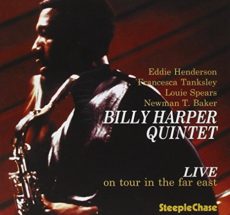
Daily Dose Of Jazz…
Billy Harper: The Tenor Titan Who Sang Before He Could Speak Jazz
Long before Billy Harper picked up a tenor saxophone, he was already making music with his voice. Born January 17, 1943, in Houston, Texas, he was singing choral and solo pieces at both secular and sacred events by age five. Music wasn’t something he discovered, it was something already flowing through him, as natural as breathing.
A Prodigy Finds His Instrument
By 14, while still attending Worthing High School, Harper had already formed his first Billy Harper Quintet, a remarkably ambitious move for a teenager. After graduating cum laude, he headed to North Texas State University to study saxophone and music theory, joining their powerhouse big band that was already legendary in jazz education circles. In 1965, the ensemble took first prize at the Kansas Jazz Festival, with Harper’s passionate tenor playing catching the attention of everyone in earshot.
The Move That Changes Everything
The following year, 1966, Harper made the pilgrimage every serious jazz musician eventually makes: New York City. His Coltrane-influenced sound—spiritually intense, harmonically sophisticated, and emotionally raw immediately caught ears. Soon he was playing with jazz royalty: two transformative years with drum master Art Blakey, followed by stints with Elvin Jones, the Thad Jones/Mel Lewis Orchestra, Max Roach, Randy Weston, and Gil Evans throughout the 1970s. These weren’t just gigs; they were nightly masterclasses with living legends who had helped define modern jazz.
Global Ambassador, Singular Vision
Harper toured the world with these groups—Africa, Europe, Japan, across the United States—absorbing influences and sharing his sound with audiences everywhere. But it was his work as a leader that truly showcased his unique vision and voice.
His 1973 album Capra Black became a seminal statement of Black consciousness, fusing avant-garde jazz exploration with gospel fervor and political urgency. Then came 1976’s Black Saint, which not only launched the influential Italian label of the same name but announced Harper as a major international force—a composer, bandleader, and conceptualist with something important to say.
A Prolific Career
With over twenty albums to his name and collaborations with flutist Bobbi Humphrey, trumpeter Lee Morgan, and pianist McCoy Tyner (among many others), Harper has spent recent decades recording primarily for the respected Steeplechase and Evidence labels, documenting his continuing evolution as an artist.
Giving Back
And he’s never stopped teaching—generously sharing his hard-won knowledge at Livingston College, Rutgers University, and The New School of Jazz and Contemporary Music, earning grants and awards along the way. For Harper, passing on the tradition is as important as extending it.
Still Blowing Strong
He continues touring the globe, still delivering that powerful, spiritually charged tenor sound that’s unmistakably his own. His playing carries the weight of gospel testifying, the intellectual rigor of advanced harmonic thinking, and the emotional honesty of someone who’s lived deeply and honestly through their music.
From Houston church choirs to the world’s greatest concert halls and jazz festivals—that’s a journey worth listening to. And Billy Harper is still writing new chapters.
More Posts: saxophone
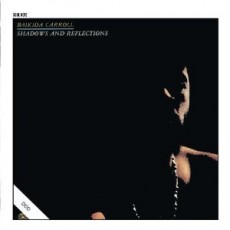
Daily Dose Of Jazz…
Baikida Carroll: From St. Louis Streets to the Avant-Garde
Some musicians are born into jazz, literally. Baikida Carroll arrived on January 15, 1947, in St. Louis, Missouri, as the son of tenor saxophonist Jimmy Harris. Music wasn’t just in the house; it was the family business, the air he breathed, the language spoken at the dinner table.
A High School Band for the Ages
As a teenager, Carroll played trumpet in his high school band alongside a young pianist named Donny Hathaway (yes, that Donny Hathaway), while studying theory with his mentor Vernon Nashville. Through the All-City Jazz Band, he connected with future innovators Lester Bowie, J.D. Parran, and James Jabbo Ware. These weren’t just bandmates, they were co-conspirators in what would become the future of creative jazz.
Learning the Craft, Breaking the Rules
Carroll sharpened his technical skills at Southern Illinois University and the Armed Forces School of Music, building a foundation solid enough to support the experimental flights to come. Then he dove headfirst into St. Louis’s Black Artists Group (BAG), where he directed their groundbreaking free jazz ensemble. The 1970s found this revolutionary collective recording in Europe, pushing boundaries and redefining what jazz could be communal, spiritual, and liberated from commercial constraints.
Walking Both Sides of the Street
But here’s what makes Carroll fascinating: he never stayed in one lane. During that same decade, while exploring the outer reaches of avant-garde expression, he was also gigging with blues and R&B royalty—Albert King, Little Milton, Fontella Bass, and Tina Turner. Between gigs, he took master classes with legends like Oliver Nelson, Thad Jones, Ron Carter, Mel Lewis, Phil Woods, and Roland Hanna. Talk about range. Talk about refusing to be boxed in.
A Staggering Body of Work
His discography tells the full story: four albums as a leader and over thirty as a sideman, collaborating with an astonishing roster that includes Sam Rivers, Carla Bley, Steve Lacy, Anthony Braxton, Oliver Lake, Jack DeJohnette, Muhal Richard Abrams, and Julius Hemphill, among many others. Each collaboration reveals a different facet of his musical personality—from tender balladry to explosive free improvisation.
Beyond the Bandstand
Theater called to him too, with credits spanning productions from Cat on a Hot Tin Roof to Having Our Say. Fellowships, awards, board positions, Carroll’s contributions to music and the arts run deep and wide, extending far beyond his trumpet playing into education, advocacy, and community building.
Multiple Lifetimes, One Musician
This is a musician who’s lived multiple lifetimes within jazz, each one worth exploring, each one revealing new dimensions of what’s possible when you refuse to choose between tradition and innovation, between accessibility and experimentation, between commercial viability and artistic integrity.
Baikida Carroll didn’t just play the trumpet. He used it to ask questions, challenge assumptions, and remind us that jazz has always been about freedom, musical, personal, and otherwise.
More Posts: trumpet
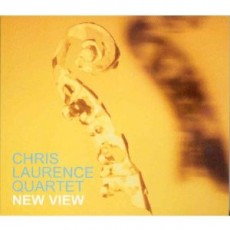
Daily Dose Of Jazz…
Chris Laurence: A Master Bassist Bridging Classical and Jazz Worlds
Born in the heart of London on January 6, 1949, Chris Laurence grew up in a city where musical boundaries have always been meant to be crossed. As a double bassist, he drew inspiration from an eclectic mix of visionaries—Keith Jarrett’s lyrical piano explorations, Miroslav Vitous’s revolutionary bass work, Tony Coe’s clarinet mastery, and Chick Corea’s fusion innovations. These diverse influences would shape Laurence into one of Britain’s most versatile and sought-after bassists.
A Career of Creative Collaborations
Laurence first gained significant recognition during the 1980s through his work in various innovative trios with the adventurous drummer Tony Oxley. In 1984, he expanded his musical palette further by joining the prestigious London Bach Orchestra—a move that showcased his ability to move fluidly between the worlds of jazz improvisation and classical precision.
His collaborative spirit has led him to work with a remarkable roster of British jazz luminaries: the atmospheric saxophonist John Surman, the powerful tenor voice of Alan Skidmore, the poetic pianist John Taylor, the lyrical trumpeter Kenny Wheeler, and the versatile percussionist Frank Ricotti. Each partnership revealed a different facet of Laurence’s musical personality.
An Extraordinary Session Legacy
As a sideman, Laurence’s discography reads like a who’s who of contemporary music. He has appeared on some twenty-one albums alongside artists as varied as Pink Floyd’s David Gilmour, minimalist composer Michael Nyman, pianist Gordon Beck, saxophonist Elton Dean, and classical guitarist John Williams. His bass lines have graced recordings on virtually every major label—EMI, CBS, Turtle, ECM, Vinyl, MN, Virgin Venture, Ogun, Sony Classical, and Columbia—testament to his universal appeal and adaptability.
Stepping into the Spotlight
After decades of enriching others’ music, Laurence recently stepped forward as a leader, forming the Chris Laurence Quartet and releasing his debut album “New View.” The title itself seems to acknowledge a career spent supporting others’ visions—now, finally, it’s time for his own perspective to take center stage.
For those who know jazz and classical music in Britain, Chris Laurence’s name represents reliability, creativity, and that rare ability to make every note count—whether behind a bandleader or leading his own ensemble.
More Posts: bass
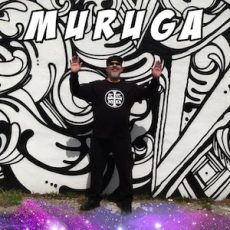
Daily Dose Of Jazz…
Muruga Booker was born Steven Bookvich on December 27, 1942 in Highland Park, Michigan at Highland Park General Hospital. His father played accordion ndfirst played the accordion before taking up drums as a preteen. He studied under Misha Bichkoff, a Russian music teacher and played drums professionally in 1961 with “The Low Rocks” in Detroit, Michigan as Steve Booker, achieving local recognition playing in 1962.
1964 saw him playing with folk-rock singers, psychedelic folk rock band and was a member of The Casuals to back up Brenda Lee. In 1968 he joined Paul Winter and The Winter Consort, and performed on their album Something in the Wind. In 1969,he played Woodstock, met Swami Satchidananda who gave him the name Muruga. He went on to play with Ted Nugent, record with Allen Ginsberg and Bob Dylan before joining Darius Brubeck, and forming the electronic experimental trio MBR. Then he toured as part of the Darius Brubeck Ensemble, and played with Dave Brubeck, Gerry Mulligan, Paul Desmond and Alan Dawson.
He recorded with Weather Report in the Seventies, moved to New York City and worked on several projects. Back in Detroit he left jazz and became a member of George Clinton’s P-Funk All-Stars. He move to Oakland, California in mid-1985 and formed Murunga UFM, with his next move being to Ann Arbor, Michigan where he established a recording studio called Sage Ct. Studio..
In 2003 Booker returned to playing and recording jazz as the Global Jazz Trio and as a five-piece group called The Global Jazz Project before creating a duo.
Drummer Muruga Booker, who won Outstanding World Music Instrumentalist and six Detroit Music Awards, continues to perform and record in a variety of music genres.
More Posts: bandleader,crums,history,instrumental,jazz,music
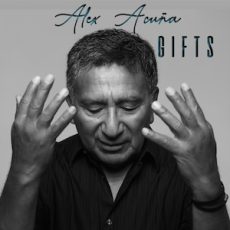
Daily Dose Of Jazz…
Alex Acuña was born Alejandro Neciosup Acuña on December 12, 1944 in Pativilca, Peru. He played in local bands such as La Orquesta de los Hermanos Neciosup from the age of ten, then followed his brothers and moved to Lima, Peru as a teenager. At the age of eighteen he joined the band of Perez Prado, and in 1965 moved to San Juan, Puerto Rico.
In 1974 he moved to Las Vegas, Nevada and worked with Elvis Presley, The Temptations, and Diana Ross. The following year he joined the jazz-fusion group Weather Report, and while in New York City, Acuña recorded several songs for RCA records. Leaving Weather Report in 1978 he became a session musician in California, recording and playing live with r&b and jazz musicians Ella Fitzgerald, Michael Jackson, Chick Corea, Wayne Shorter, Joe Zawinul, Herbie Hancock, Carlos Santana, Antonio Carlos Jobim, Roberta Flack,Al Jarreau and the list goes on and on.
The Eighties saw Alex recording and touring with the Christian jazz band Koinonia. In 1987 he was summoned back to Perú by producer Ricardo Ghibellini to be the musical producer of Los Hijos del Sol, a group of Peruvians designed to promote Peruvian music worldwide.
Drummer and percussionist Alex Acuña, who has worked as an educator at University of California Los Angeles, and Berklee College of Music, LAMA, Musicians Institute, USC, and CSUN, continues his career of performing and educating.
More Posts: bandleader,drums,history,instrumental,jazz,music,percussion


